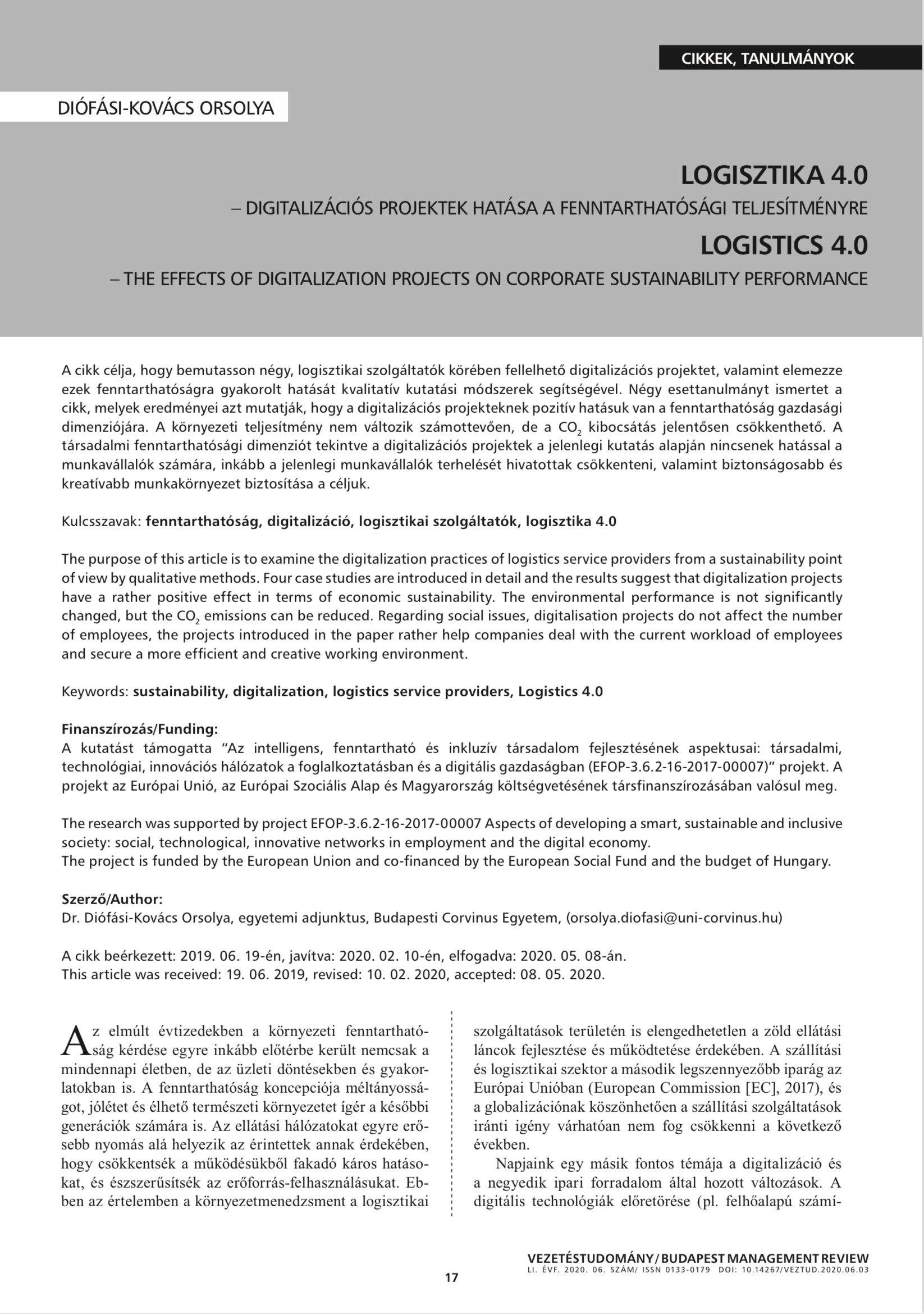Logisztika 4.0
Digitalizációs projektek hatása a fenntarthatósági teljesítményre
DOI:
https://doi.org/10.14267/VEZTUD.2020.06.03Kulcsszavak:
fenntarthatóság, digitalizáció, logisztikai szolgáltatók, logisztika 4.0Absztrakt
A cikk célja, hogy bemutasson négy, logisztikai szolgáltatók körében fellelhető digitalizációs projektet, valamint elemezze ezek fenntarthatóságra gyakorolt hatását kvalitatív kutatási módszerek segítségével. Négy esettanulmányt ismertet a cikk, melyek eredményei azt mutatják, hogy a digitalizációs projekteknek pozitív hatásuk van a fenntarthatóság gazdasági dimenziójára. A környezeti teljesítmény nem változik számottevően, de a CO2 kibocsátás jelentősen csökkenthető. A társadalmi fenntarthatósági dimenziót tekintve a digitalizációs projektek a jelenlegi kutatás alapján nincsenek hatással a munkavállalók számára, inkább a jelenlegi munkavállalók terhelését hivatottak csökkenteni, valamint biztonságosabb és kreatívabb munkakörnyezet biztosítása a céljuk.
Letöltések
Hivatkozások
Benitez-Amado, J., Chen, Y., & Abu-Ajamieh, A. (2014). E-business Technology, Operational Competence and Profitability. The Evolution of the Impact of E-business Technology on Operational Competence and Profitability in the Economic Downturns. Retrieved from https://decisionsciences.org/wp-content/uploads/2017/11/p747090.pdf
DHL. (2018). Logistics Trend Radar. Retrieved from https://www.logistics.dhl/global-en/home/insightsand-innovation/thought-leadership/trend-reports/logistics-trend-radar.html
EC. (2018). EU Transport in Figures [Data file]. Statistical Pocketbook 2018. Retrieved from https://ec.europa.eu/transport/facts-fundings/statistics/pocketbook-2018_en
Evangelista, P. (2014). Environmental sustainability practices in the transport and logistics service industry: An exploratory case study investigation. Research in Transportation Business & Management, 12, 63–72. https://doi.org/10.1016/j.rtbm.2014.10.002
Evangelista, P., Santoro, L., & Thomas, A. (2018). Environmental Sustainability in Third-Party Logistics Service Providers: A Systematic Literature Review from 2000-2016. Sustainability, 10(5), 1627. https://doi.org/10.3390/su10051627
Evans, N. D. (2017). Digital sustainability: Digital transformation’s next big opportunity. CIO. Retrieved from https://www.cio.com/article/3170647/digital-transformation/digital-sustainability-digitaltransformations-next-big-opportunity.html
Gimenez, C., Sierra, V., Rodon, J. & Rodriguez, J. (2015). The role of information technology in the environmental performance of the firm: The interaction effect between information technology and environmental practices on environmental performance. Academia Revista Latinoamericana de Administración, 28(2), 273-291. https://doi.org/10.1108/ARLA-08-2014-0113
IEA. (2017). CO2 Emissions from Fuel Combustion Highlights. https://doi.org/10.1787/22199446
I-SCOOP. (2018). Digitization, digitalization and digital transformation: the differences. Retrieved from https://www.i-scoop.eu/digitization-digitalization-digitaltransformation-disruption
Ishida, H. (2015). The effect of ICT development on economic growth and energy consumption in Japan. Telematics and Informatics, 32(1), 79-88. https://doi.org/10.1016/j.tele.2014.04.003
ITF. (2016). The Carbon Footprint of Global Trade. Tackling Emissions from International Freight Transport. Retrieved from https://www.itf-oecd.org/sites/default/files/docs/cop-pdf-06.pdf
Kang, Y.-S., Youm, S., Lee, Y.-H., & Rhee, J. (2013). RFID-based CO2 emissions allocation in the thirdparty logistics industry. Journal of Food Agriculture and Environment, 11(3&4), 1550–1557.
Kayikci, Y. (2018). Sustainability impact of digitization in logistics. Procedia Manufacturing, 21, 782–789. https://doi.org/10.1016/j.promfg.2018.02.184
Kim, S.-T., & Han, C.-H. (2011). Measuring Environmental Logistics Practices. The Asian Journal of Shipping and Logistics, 27(2), 237–258. https://doi.org/10.1016/s2092-5212(11)80011-8
KSH (2018). Szállítási teljesítmények, közúti közlekedési balesetek, 2017. IV. negyedév. Statisztikai Tükör, 2018. márc. 2. Retrieved from https://www.ksh.hu/docs/hun/xftp/gyor/sza/sza1712.pdf
Lee, J. W., & Brahmasrene, T. (2014). ICT, CO2 Emissions and Economic Growth: Evidence from a Panel of ASEAN. Global Economic Review, 43(2), 93–109. https://doi.org/10.1080/1226508X.2014.917803
Léonardi, J., & Baumgartner, M. (2004). CO2 efficiency in road freight transportation: Status quo, measures and potential. Transportation Research Part D: Transport and Environment, 9(6), 451–464. https://doi.org/10.1016/j.trd.2004.08.004
Lieb, R., & Lieb, K. (2010). The North American thirdparty logistics industry in 2008: The provider CEO perspective. Transportation Journal, 49(2), 53–65.
Liimatainen, H., Stenholm, P., Tapio, P., & McKinnon, A. (2012). Energy efficiency practices among road freight hauliers. Energy Policy, 50, 833–842. https://doi.org/10.1016/j.enpol.2012.08.049
Lin, C.-Y., & Ho, Y.-H. (2011). Determinants of Green Practice Adoption for Logistics Companies in China. Journal of Business Ethics, 98, 67–83. https://doi.org/10.1007/s10551-010-0535-9
Lun, Y. H. V. (2011). Green management practices and firm performance: A case of container terminal operations. Resources, Conservation and Recycling, 55(6), 559–566. https://doi.org/10.1016/j.resconrec.2010.12.001
Maas, S., Schuster, T., & Hartmann, E. (2012). Pollution Prevention and Service Stewardship Strategies in the Third-Party Logistics Industry: Effects on Firm Differentiation and the Moderating Role of Environmental Communication. Business Strategy and the Environment, 23(1), 38–55. https://doi.org/10.1002/bse.1759
Matthews, H. S., Williams, E., Tagami, T., & Hendrickson, C. T. (2002). Energy implications of online book retailing in the United States and Japan. Environmental Impact Assessment Review, 22(5), 493-507. https://doi.org/10.1016/S0195-9255(02)00024-0
Melville, N. P. (2010). Information systems innovation for environmental sustainability, MIS Quarterly, 34(1), 1-21. https://doi.org/10.2307/20721412
Nagy, J., Oláh, J., Erdei, E., Máté, D., & Popp, J. (2018). The Role and Impact of Industry 4.0 and the Internet of Things on the Business Strategy of the Value Chain—The Case of Hungary. Sustainability, 10(10), 3491, 25. https://doi.org/10.3390/su10103491
Oberhofer, P., & Dieplinger, M. (2014). Sustainability in the transport and logistics sector: Lacking environmental measures. Business Strategy and the Environment, 23(4), 236–253. https://doi.org/10.1002/bse.1769
Perotti, S., Micheli, G. J. L., & Cagno, E. (2015). Motivations and barriers to the adoption of green supply Chain practices among 3PLs. International Journal Logistics Systems and Management, 20(2), 179–198. https://doi.org/10.1504/ijlsm.2015.067255
Sallnäs, U. (2016). Coordination to manage dependencies between logistics service providers and shippers. International Journal of Physical Distribution & Logistics Management, 46(3), 316–340. https://doi.org/10.1108/ijpdlm-06-2014-0143
Tacken, J., Sanchez Rodrigues, V., & Mason, R. (2014). Examining CO2 reduction within the German logistics sector. The International Journal of Logistics Management, 25(1), 54–84. https://doi.org/10.1108/ijlm-09-2011-0073
Vieira, J. G. V., Mendes, J. V., & Suyama, S. S. (2016). Shippers and freight operators perceptions of sustainable initiatives. Evaluation and Program Planning, 54, 173 – 181. https://doi.org/10.1016/j.evalprogplan.2015.07.011
Wang, Y., Sanchez Rodrigues, V., & Evans, L. (2015). The use of ICT in road freight transport for CO2 reduction – an exploratory study of UK’s grocery retail industry. The International Journal of Logistics Management, 26(1), 2–29. https://doi.org/10.1108/ijlm-02-2013-0021
Weber, D. M., & Kauffman, R. J. (2011). What drives global ICT adoption? Analysis and research directions. Electronic Commerce Research and Applications, 10(6), 683–701. https://doi.org/10.1016/j.elerap.2011.01.001
WEF in cooperation with Accenture. (2016). Digital Transformation of Industries, Logistics Industry. White paper. Retrieved from http://reports.weforum.org/digital-transformation/wp-content/blogs.dir/94/mp/files/pages/files/dti-logistics-industry-white-paper.pdf
Yi, L., & Thomas, H. R. (2007). A review of research on the environmental impact of e-business and ICT. Environment International, 33(6), 841-849. https://doi.org/10.1016/j.envint.2007.03.015
Yin, R.K. (2003). Case study research: Design and methods. Newbury Park: Sage Publications.

Downloads
Megjelent
Hogyan kell idézni
Folyóirat szám
Rovat
License
Authors assign copyright to Vezetéstudomány / Budapest Management Review. Authors are responsible for permission to reproduce copyright material from other sources.

